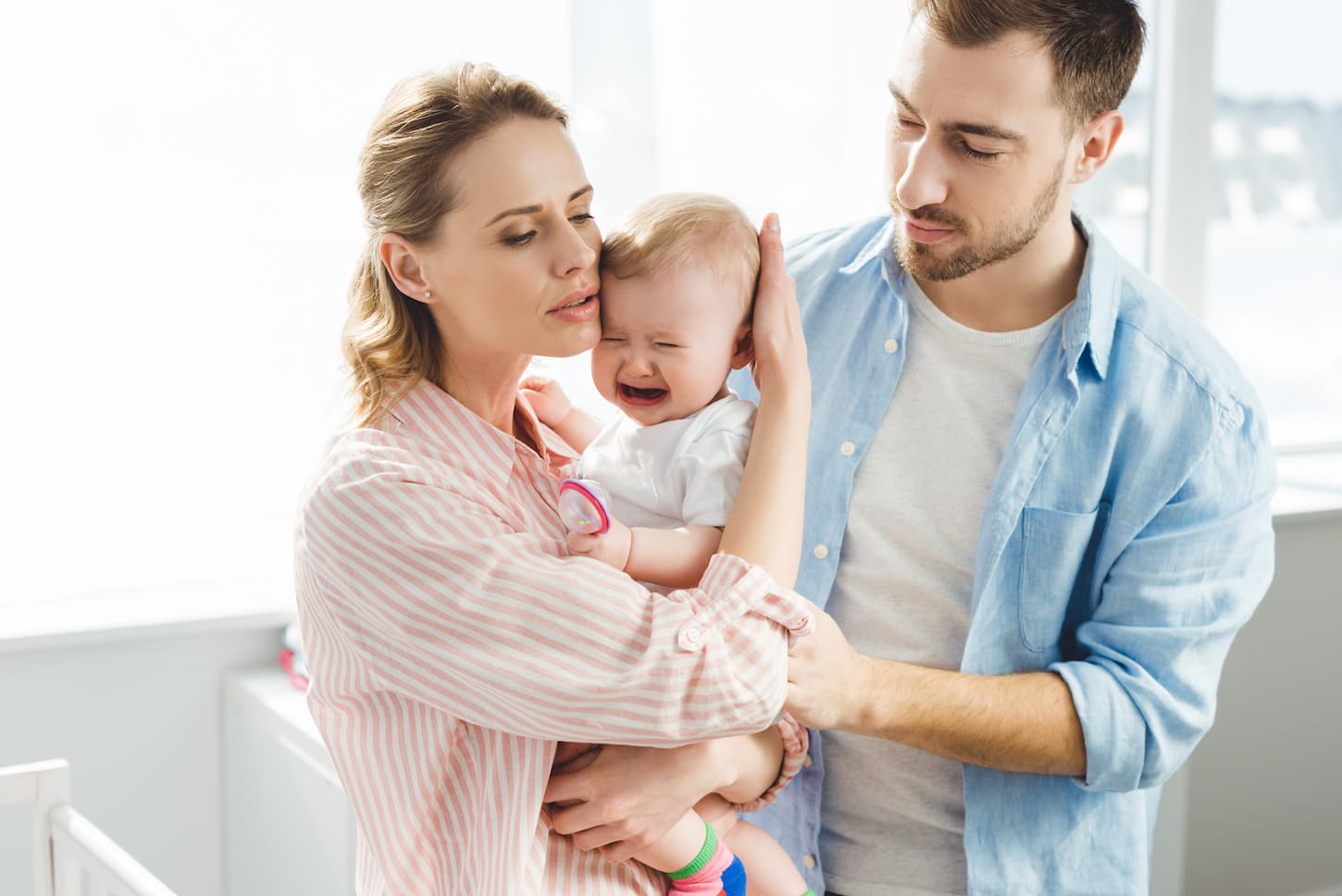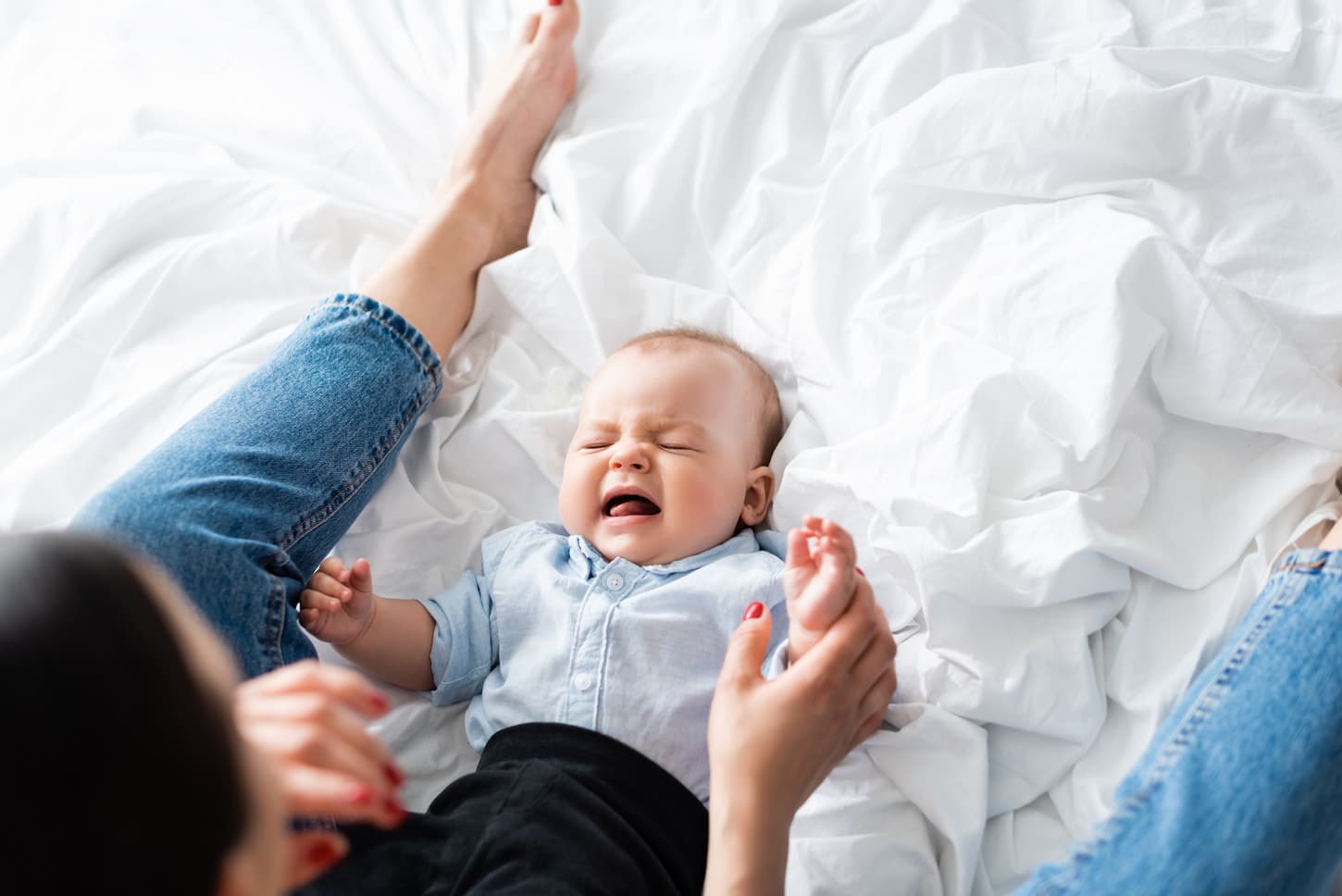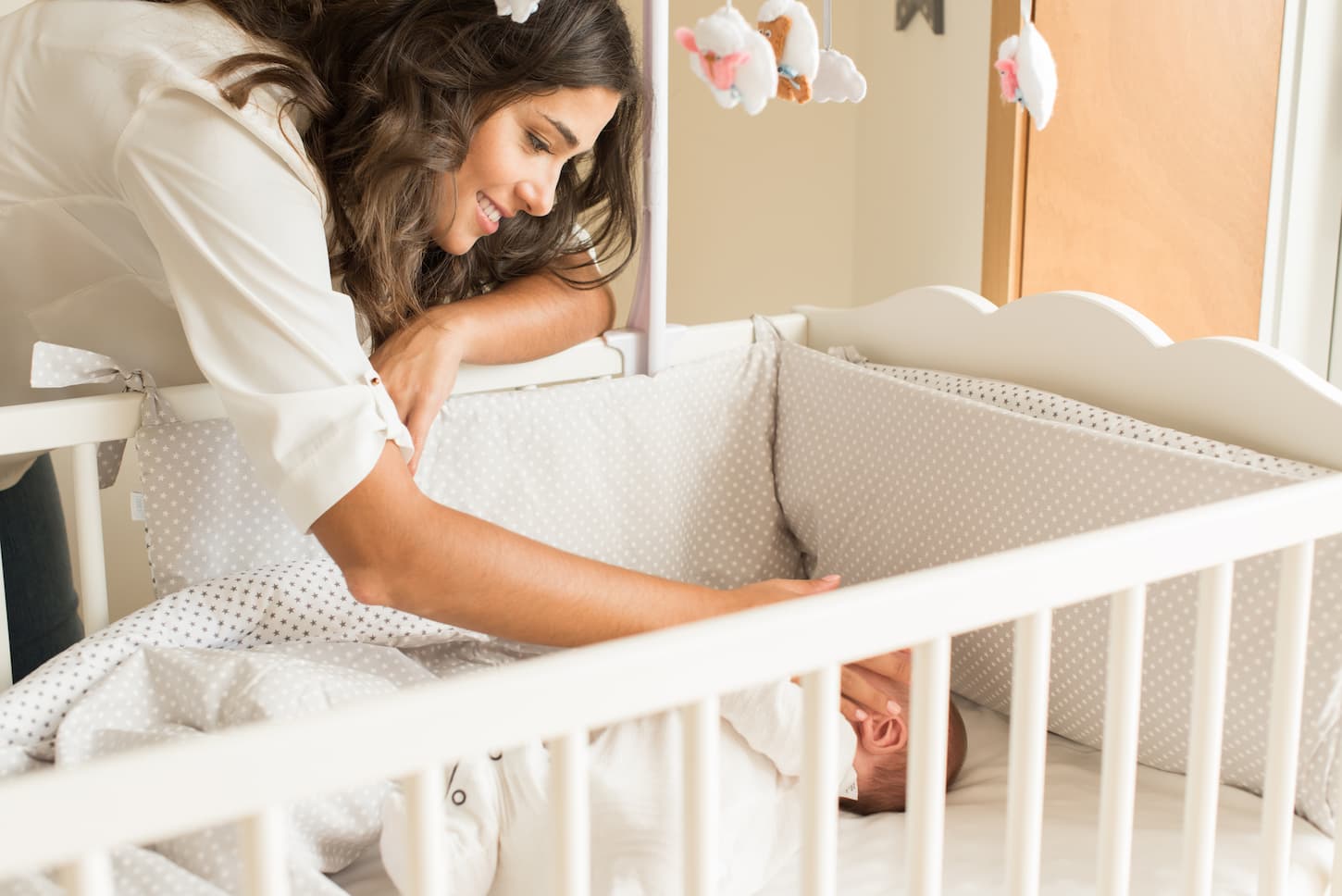As a new parent, you get concerned when you hear your baby cry in the middle of the night. Why do babies cry during the night? Why do they cry during nighttime checks? And what is the magic formula to calm your baby?
Babies may cry during the nighttime to check if they are awoken accidentally or if they have another need. Crying is their most effective way to communicate an immediate need, so they will cry for comfort if they are startled awake.
Although there is no magic formula that can help you, there are a couple of methods and tricks that are worth trying out! These will help you as a parent to understand more why your baby cries at night, and they will, for sure, create a stronger bond between you and your baby!

Why Is My Baby Suddenly Crying at Night?
Babies cry at night because crying is their most effective means of communication. Babies cry due to hunger, dirty diapers, loneliness, needing comfort, lack of adaption to circumstances, sickness, teething, or just because. When a baby cries, they should be comforted.
If you are a new parent, here is the truth: newborns cry. They cry a lot. This is normal and expected. That is how you know your baby is hungry, or they need your help, or that baby wants extra cuddling! Parents often associate the baby’s crying with our adult concept of crying, which is usually when we are sad.
Most parents worry when their baby is crying because they have to guess why due to the fact that babies can’t talk. If your baby is younger than six months, then for sure the baby will cry more often during the night. For a parent, it is better to take naps whenever they can.
Here are a couple of reasons why your baby is crying at night. When in doubt, we always advise parents to consult with the baby’s doctor. They are professionals who will help you and ease your mind.
Reason #1: Hunger
Hunger is the most common reason why babies cry at night. As a matter of fact, crying is a late cue of hunger. Usually, before crying, babies give us subtle signs they need a feed. Most of the time, we don’t recognize them.
The signs are as follows:
- babies are more active
- babies turn their heads to the side
- babies drool more or smack their lips
- babies suck their clothes or fingers
- babies clench their little hands into fists
Reason #2: Sleepiness
Sleepiness or being overtired is another paradoxical reason why your baby is crying at night. Perhaps, your baby is in an uncomfortable position and can’t fall asleep. Another interesting reason is, that your baby is fighting sleep. Yes, you read it right. Your baby is a little fighter against sleep.
Sometimes babies can’t settle down and fall asleep, especially when they are overtired. Newborns need a lot of sleep; they can’t handle too much awake time. Hence they become overtired.
Also, babies cannot be tired enough. This is usually due to some overstimulated activities before bedtime like shiny and beeping toys.
Want help with an overtired baby? Read our article on what to do here.
Reason #3: Overfeeding or gassiness
If a baby is overfed or wasn’t burped, they may cry because of a bloated stomach or due to a gas bubble. Try burping the baby.
Reason #4: Discomfort: clothes, diapers, temperature
Like adults, babies find sleeping difficult if they aren’t comfortable.
Temperature is a big issue. Being too cold or too hot causes a baby to cry.
What a baby is wearing can cause them to cry. Too tight clothes can make the baby cry, or so can the wrong kind of fabric, depending on your baby’s touch preferences.
You can read more about the right (and wrong) pajamas for sleeping in our article here: Are Polyester Clothes and Pajamas Safe for Babies?
A dirty diaper being a problem is a no-brainer. Babies will let you know if you need to change a dirty diaper.
Reason #5: Feeling sick, colic, or teething
Your baby may have a high temperature or may feel unwell. When this happens, always consult the baby’s doctor.
Colic is common in newborns. This is not a disease but rather a condition when a healthy baby is crying frequently for no particular reason.
Teething can also cause a baby discomfort which causes crying.

Should I Check on My Baby When They Cry During Nighttime Checks?
Babies that cry during a nighttime check should be checked to make sure they are safe and don’t need a diaper change. After a baby’s needs are met, a parent may choose to let the baby cry (if doing a cry-it-out sleep training method) or pick them up and comfort them.
In my experience, babies that woke up during a nighttime check were usually because they heard me and wanted to snuggle. I learned to be quieter during checks and to phase them out entirely.
Seriously, a video monitor is a new mom’s best friend.
Should I Check on My Baby While Sleep Training?
Parents are always encouraged to check on their children while sleep training if they ever feel concerned. Checks can be in-person, via a monitor (sound or video), or by asking someone else to check on the baby.
If you just want to make sure that your baby is okay, but you’ve found that checking on them in person makes them cry more, consider changing to a video or sound-based monitor. That way, you can check in on your child to your heart’s content without waking them.
How Often Do You Check on a Crying Baby?
Crying babies should always be checked on. Depending on the circumstances, they can be checked via a video monitor, a sound monitor, or in other ways. The baby’s cries will help a parent know how quickly they need to respond to the baby’s needs.
Now, if you’re ever stressed out and need a minute before checking on the baby, know that that can be an option. If you can, make sure there’s nothing life-threatening first, then you can take a few minutes (if needed) to address whatever other issue is at hand.
And again, if you’re ever concerned, please consult your pediatrician or an appropriate healthcare provider.
When Should I Be Concerned About My Baby Crying at Night?
Any time a baby’s cries are concerning or there is an issue that needs to be addressed, a parent should step up to fix things. If a baby’s cries continue or worsen, especially when being held, then a parent may want to consult a pediatrician.
If you are at all concerned, please call your on-call pediatrician or consider going to an appropriate nighttime healthcare provider (like urgent care or emergency department).
In my experience, most small things could be resolved with a snuggle and/or some nighttime feedings. It’s the bigger issues that didn’t calm down quickly, and then it’s totally appropriate to get medical help.
Do You Have to Check-In On a Baby In Person?
Babies can be checked in on via any of several methods including in-person, via a baby monitor (sound only), a video monitor, or by asking a partner or friend to check on the baby (as is appropriate). Using a video monitor with sound is a great way to check on a baby without going into the bedroom.
We installed a video monitor in our nursery with the explicit reason of being able to check in on our children without going in there because I had a bad habit of waking them up on accident. A video monitor let me check in on them without waking them.

Next Steps
Sleep training is a process. Don’t feel pressured to teach your baby as fast as possible to sleep. It is important that your baby learns the different rhythms of day and night. But what is also important is to be responsive to the baby’s needs.
Parents are wired to react when the baby is crying. Your instinct is to soothe your baby with breastfeeding, kissing, calming sounds, or physical contact.
There will be nights when your baby finds it difficult to fall asleep. The best you can do is to establish a consistent routine. Changing your baby’s sleeping habits is a step-by-step process so arm yourself with patience.
It is tempting to rock your baby to sleep and then softly put the baby into the crib. Doing this every night will make it harder for the baby to fall asleep alone. Of course, you can cuddle your baby! We recommend finding the perfect balance between teaching the baby how to fall asleep without your assistance and enjoying your hugs and cuddles.
There are so many reasons why your baby is crying at night. If it affects the baby’s daily routine, we recommend consulting with your doctor.
If you’d like more help understanding The Science of Why Babies Cry Before Sleep (and Solutions), read this article we wrote next.